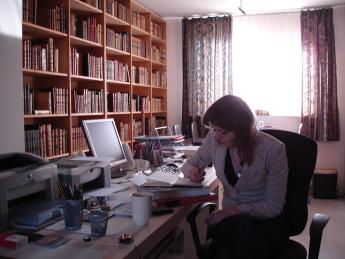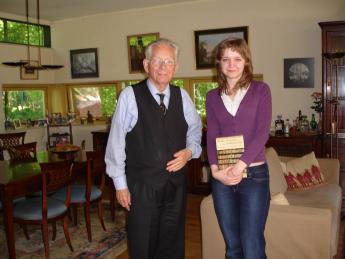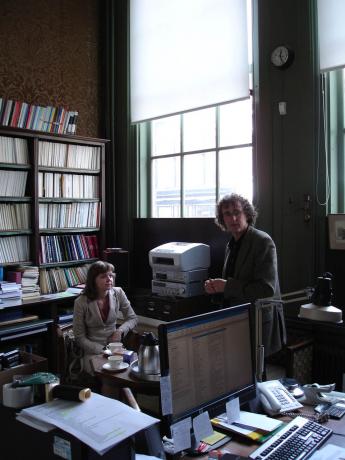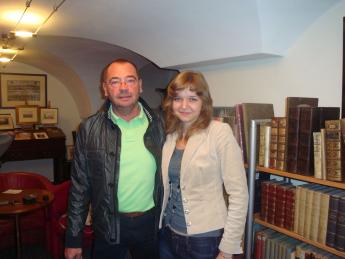ILAB Internship Program 2011 for Students of the Moscow State University of the Printing Arts I
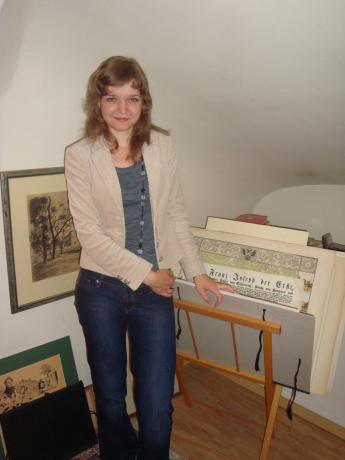
A Report by Alena Lavrenova
My internship took place from April 25 to May 28 2011. I travelled to Austria, the Netherlands and Hungary. I visited several bookstores such as Antiquariat Norbert Donhofer (Vienna), A. Gerits & Son (Amsterdam), Antiquariaat A. Kok & Zn. B.V. (Amsterdam), Musikantiquariat Ádám B?sze (Budapest), Földvári Antikvarium (Budapest), Központi Antikvárium (Budapest), etc., and also an auction house: Bubb Kuyper (Haarlem, The Netherlands). I managed to interview the current President of ILAB Arnoud Gerits, the President of The Antiquarian Booksellers’ Association of Austria, Norbert Donhofer, the President of the Hungarian Association of the Antiquarian Booksellers, Ádám B?sze, the President of The Dutch Association of Antiquarian Booksellers, Ton Kok, and two Presidents of Honour: Anton Gerits and Michael Steinbach. I worked as a bibliographer and appraiser, took part in the preparations for the London International Antiquarian Book Fair at Olympia, and visited an auction. It was a learning process. For example, Norbert Donhofer focused on the study of the engraving techniques, and Ádám B?sze explained the basic principles of working with music.
Since this internship was organized by the International League of Antiquarian Booksellers, it was very important for me to learn in details the history and major activities of the League, the largest organizations of antiquarian booksellers worldwide. First, ILAB is quality. It means that the League guarantees quality and authenticity of antiquarian books which are being sold by its members, as well as protection of the rights of buyers and sellers. Second, ILAB is connections. The League provides communication and cooperation among its affiliates. Booksellers actively communicate and help each other in finding information about books, historical persons, libraries. Third, ILAB is advertising. Every bookseller, who is affiliated to the League, has the right to put his catalogue on the ILAB website, as well as to participate in the best international book fairs.
Visiting those three countries allowed me to see not only the differences between the organization of the antiquarian book market in each country, but also to highlight the common features. So let me consider the most important features. Almost all of the bookshops that I visited have developed their own computer program, which provides a client database and a books’ archive. Such a program makes the work in an antiquarian book shop much easier and quicker and allows the owner to dispense with unnecessary employees. That’s why many antiquarian booksellers work alone. A lot of attention is paid to the book trade via Internet. Each shop has its own website, which is regularly updated with new book offers and catalogues. Also booksellers upload their recent lists and catalogues to common antiquarian and used books websites such as www.zvab.com and www.abebooks.com. All the books offered in those databases by ILAB dealers are listed in the ILAB Metasearch. These websites simplify the search of books for buyers and also help to explore the market and to make a competent appraisal of antiquarian books. The prime example of using trade via Internet is the work of Ton Kok’s bookstore in Amsterdam. It consists of four floors and a warehouse full of books. The most part of its stock comprises cheap used books. It is difficult for customers to find a proper book in this variety of titles directly in the store. Therefore, the majority of books is sold via the Internet.
Some of the antiquarian booksellers do not have open bookshops. They work at home and rent warehouses, while all their sales are made via Internet. In my opinion this is a very effective way of selling. Among these stores are A. Gerits & Son (Amsterdam), Musikantiquariat Ádám B?sze (Budapest), and Földvári Antikvarium (Budapest). For a more successful business every antiquarian bookseller advertises its services. To this purpose some produce printed catalogues of their books and send them to their clients and colleagues. For example, Norbert Donhofer produces 4-5 catalogues times a year.
It is also important to take part in the antiquarian book fairs. And I have to say that the main goal of the participation in the fairs is not to sell as many books as possible, but to make new relations, find new customers and communicate with colleagues. The calendar of international book fairs starts every year with Stuttgart (end of January). Los Angeles/San Francisco, Zurich, Milan, New York, Paris, London are among the most important fairs. Many booksellers also believe that personal visits to their customers are very important for their business. So some of them travel a lot.
One of the most important tasks for the antiquarian booksellers is to make full and correct descriptions of the books. That is why there are huge reference libraries in each bookshop. In case of selling a book with the wrong description the bookseller has to return all the money to the buyer.
The professional associations play an important role. Each country has its own national association of antiquarian booksellers. The advantages of such organizations are that they regulate the antiquarian book trade, observe the ethical standards and help new young booksellers. For example, the largest associations such as the ABA and ABAA have special funds to help booksellers being in trouble to rebuild their business and to help young booksellers to establish their businesses.
Speaking about the auctions we must note that in Europe there are auction houses which are related only to antiquarian books and graphics. One of the largest book auction houses in Holland is Bubb Kuyper. They hold auctions twice a year. The number of lots reaches 6000 and the auction takes 4 days.
Regarding to the peculiarities of the book trade in each country, I would like to highlight briefly only those features which are the most important as it seems to me. There is a very long tradition of collecting and selling antiquarian books in Austria. Certainly most of the bookshops are concentrated in Vienna. It is vital for a successful trading to run a public shop where bibliophiles can come, chat with the owner and choose the proper book. Historically the main way to trade in the Netherlands is importing and exporting of goods. The Dutch antiquarian book market is very small, so you need to look for new customers in other countries. For this purpose many booksellers travel to various countries all over the world, find new customers and send them their catalogues. It is also very important for them to take part in international book fairs and to check the catalogues of the auctions in France, Germany, Belgium and other countries, as well as catalogues of their foreign colleagues. The whole organization of the antiquarian book trade in Hungary seemed very interesting to me. Most of the shops are related to used books, and not to antiquarian books. Almost every shop in Hungary runs book auctions several times a year. There is even a special website (http://axioart.axio.hu/) where all the booksellers put their auction catalogues. There are about 4 or 5 antiquarian book auctions in Budapest in a month.
Now I will make some conclusions concerning the improvement of the antiquarian book trade in Russia.
1. It is necessary to re-organize the professional association of antiquarian booksellers. Indeed, the association will not only unite booksellers and develop ethical standards for the book trade which would streamline our antiquarian market, but it will also get an opportunity to influence on the Russian laws concerning the import and export of antiquarian books. It will favour the development of bibliology and competence, which is also important for a successful development of the market.
2. It is necessary to develop the book trade via Internet. I have to admit that in Russia only 15% of the antiquarian booksellers have their own websites.
3. Russian auction houses and bookshops should issue their own printed catalogues.
4. More booksellers should take part in antiquarian book fairs which are held in Moscow and St. Petersburg every year, and they should also attend the most important international book fairs to build up relationships to international colleagues and dealers.
5. It is necessary to develop a special computer program that would provide shops and auction houses with a quick and easily accessible way to work with a client database and book archives. Unfortunately in Russia many organizations still use a simple Excel program.
In conclusion, I would like to mention the great cultural program of my internship, which included visits to the national libraries of Hungary and Austria, the National Archive of Hungary, as well as numerous museums and galleries (in Vienna: Globe Museum, Papyrus Museum, Museum Ludwig, Leopold Museum, Vienna State Opera, National Concert Hall, The Albertina etc.; in Budapest: National Museum, the Museum of Literature; in Amsterdam: The Rijksmuseum, Museum of Modern Art and others; in The Hague: Mauritshuis).
I am very grateful to the League and especially to Norbert Donhofer, Eric Waschke, Arnoud Gerits and Ádám B?sze for the organization of this internship. It improved my skills and also showed that the educational program of the Moscow State University of Printed Arts is "correct".
Read the reports by
